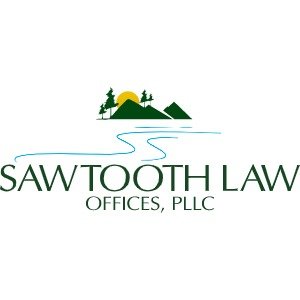Best Financial Services Regulation Lawyers in Twin Falls
Share your needs with us, get contacted by law firms.
Free. Takes 2 min.
List of the best lawyers in Twin Falls, United States
About Financial Services Regulation Law in Twin Falls, United States
Financial Services Regulation encompasses the laws and rules governing the operations of financial institutions such as banks, investment companies, insurance companies, and brokers in Twin Falls and across the United States. These regulations are designed to maintain the integrity and stability of the financial system, protect consumers, and ensure the provision of fair and transparent financial services. The regulatory framework is overseen by federal agencies such as the Securities and Exchange Commission (SEC), the Federal Reserve, and the Consumer Financial Protection Bureau (CFPB), alongside state-specific regulatory bodies.
Why You May Need a Lawyer
Individuals and businesses in Twin Falls might require legal assistance in Financial Services Regulation for several reasons. Common situations include ensuring compliance with federal and state regulations, navigating complex transactions or financial instruments, handling audits or investigations by regulatory bodies, resolving disputes with financial institutions, and protecting consumer rights in financial dealings. A lawyer can provide invaluable support in interpreting the multifaceted laws and offer guidance on legal strategies and compliance issues.
Local Laws Overview
In Twin Falls, financial services regulation encompasses both federal and state-level statutes and regulations. Idaho’s Department of Finance plays a key role in overseeing state-chartered financial institutions, licensing, and the enforcement of state financial laws. Key areas of focus include consumer protection, ensuring fair lending practices, and addressing issues such as mortgage fraud, which are especially relevant to local communities. Understanding these regulations is critical for both financial institutions and consumers engaged in financial services.
Frequently Asked Questions
What is Financial Services Regulation?
It refers to the legal framework that governs financial institutions' activities, ensuring compliance, protecting consumer rights, and maintaining financial market integrity.
Who regulates financial services in Twin Falls?
Financial services in Twin Falls are regulated by a combination of federal agencies, such as the SEC and CFPB, and the Idaho Department of Finance.
Do I need a lawyer to start a financial services business in Twin Falls?
While not legally required, hiring a lawyer is advisable to navigate the complex regulatory requirements, secure necessary licenses, and ensure compliance with applicable laws.
What consumer protections exist in Twin Falls under financial regulation laws?
Consumers are protected by laws that ensure transparency, prevent unfair practices, and promote fair lending, enforced by federal and state agencies.
How can I file a complaint against a financial institution in Twin Falls?
Complaints can be filed with the Idaho Department of Finance or federal agencies like the CFPB, depending on the nature of the issue.
What are the penalties for non-compliance with financial regulations in Twin Falls?
Penalties may include fines, sanctions, license revocation, and even criminal charges, depending on the severity and nature of the non-compliance.
Can financial regulations affect personal investment decisions?
Yes, regulations can influence the availability and terms of financial products, impacting decision-making for both individual and institutional investors.
Are there specific regulations for digital financial services in Twin Falls?
Digital financial services are subject to the same regulatory scrutiny as traditional services, with additional focus on cybersecurity and data protection.
What role does the Idaho Department of Finance play in financial regulation?
The Department oversees state-specific regulations, licensing, compliance, and enforcement actions within Idaho's financial services sector.
How often do financial regulations change?
Regulations can change frequently, influenced by legislative updates, shifting economic conditions, and technological advances in the financial industry.
Additional Resources
For those seeking further information, valuable resources include the Idaho Department of Finance, the Federal Financial Institutions Examination Council, and the Consumer Financial Protection Bureau. These organizations offer guidance, regulatory updates, and support for both consumers and financial service providers.
Next Steps
If you require legal assistance regarding Financial Services Regulation in Twin Falls, consider consulting a legal professional with expertise in financial law. Initial consultations can provide clarity on your situation and the appropriate course of action. It's also beneficial to stay informed about ongoing regulatory changes by subscribing to alerts from regulatory bodies or engaging with industry-focused educational programs.
Lawzana helps you find the best lawyers and law firms in Twin Falls through a curated and pre-screened list of qualified legal professionals. Our platform offers rankings and detailed profiles of attorneys and law firms, allowing you to compare based on practice areas, including Financial Services Regulation, experience, and client feedback.
Each profile includes a description of the firm's areas of practice, client reviews, team members and partners, year of establishment, spoken languages, office locations, contact information, social media presence, and any published articles or resources. Most firms on our platform speak English and are experienced in both local and international legal matters.
Get a quote from top-rated law firms in Twin Falls, United States — quickly, securely, and without unnecessary hassle.
Disclaimer:
The information provided on this page is for general informational purposes only and does not constitute legal advice. While we strive to ensure the accuracy and relevance of the content, legal information may change over time, and interpretations of the law can vary. You should always consult with a qualified legal professional for advice specific to your situation.
We disclaim all liability for actions taken or not taken based on the content of this page. If you believe any information is incorrect or outdated, please contact us, and we will review and update it where appropriate.









